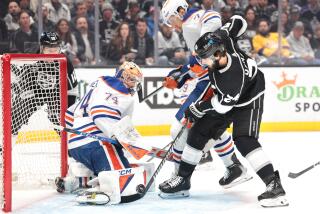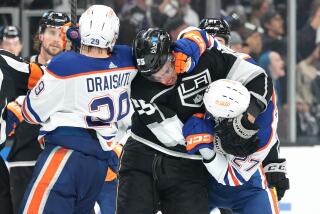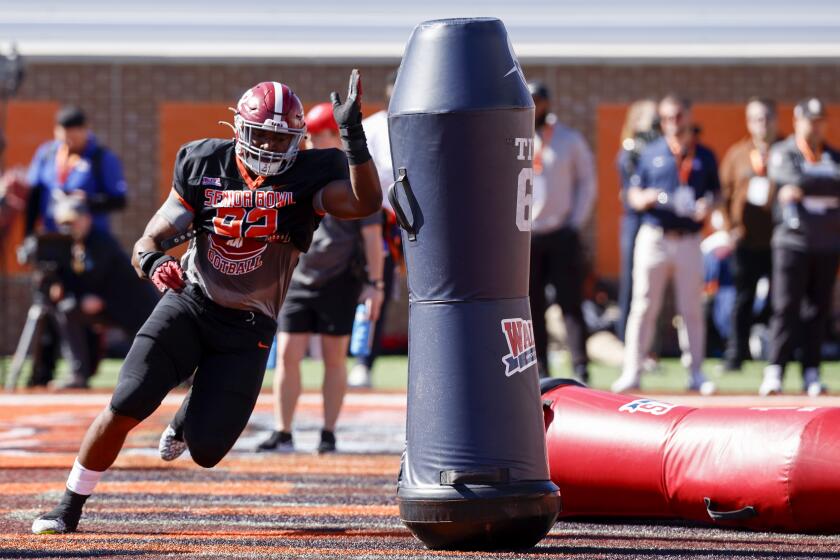Bonds Is Expected to Keep All Records
With a good month, Barry Bonds could pass Babe Ruth for second place on baseball’s home run list next April. With a good year, he could pass Hank Aaron for the all-time record next season.
Bonds figures to keep his records, no matter how tainted they might eventually be considered.
He used substances identified in a grand jury investigation as steroids, the San Francisco Chronicle reported Friday, although he testified he believed he was taking a nutritional supplement and applying an anti-arthritis balm.
Steve Hirdt, executive vice president of the Elias Sports Bureau, official statisticians of Major League Baseball, said he could recall no precedent for baseball revoking a record retroactively.
Even the asterisk once attached to Roger Maris’ record of 61 home runs in one season -- because he had more games in which to top Ruth’s standard of 60 -- has long been removed.
Former Dodger Steve Garvey, the 1974 National League most valuable player and a 10-time All-Star, said the scarlet letter worn by Bonds or any other player proved to have used steroids would tarnish any record.
“It won’t be as revered as it would be if it was done on natural ability and heart and soul, and done without cheating,” Garvey said. “Long after these people are done playing, these people will wonder whether they could have done it the natural way. They’ll have cheated themselves -- and the fans and public.”
Bonds set baseball’s single-season record by hitting 73 home runs in 2001. In a year he won an unprecedented seventh MVP award, he also set the career record for walks last season, as well as single-season records for walks, intentional walks and on-base percentage.
No matter what Bonds -- or Jason Giambi, who admitted to steroid use in his testimony -- or any other player might have illegally injected, swallowed, chewed or rubbed onto his skin, baseball officials are unlikely to take an eraser to the record book.
“People will make mental adjustments with these records,” said Lyle Spatz, chairman of the records committee of the Society for American Baseball Research. “There will always be a stain on the guys who did it. But I can’t see Major League Baseball doing anything like that.”
Pete Rose, suspended for life after violating baseball’s rule by betting on major league games, still owns every one of his record 4,256 hits, even those from games on which investigators discovered he wagered.
The records stand too of Hall of Fame pitcher Gaylord Perry, who mastered an illegal spitball, and of the 1919 Chicago White Sox, despite several players who conspired with gamblers to throw the World Series.
Bonds has repeatedly denied using steroids. Although the Chronicle reported that documents presented to the grand jury indicate Bonds did use steroids during the 2001 season, the one in which he claimed the home run record, major league rules did not forbid the use of steroids until 2003.
“Baseball was tolerant,” Garvey said.
“It wasn’t like the NBA or NFL or USOC. There wasn’t a policy in place. You can’t retroactively do that [erase records] if you don’t have a policy in place.”
Also, revoking Bonds’ mark might resolve one headache but create another.
Said Spatz: “What are they going to do, go back to [Mark] McGwire? Oops, he took steroids too. Go back to Maris?”
McGwire broke the Maris mark by hitting 70 home runs in 1998, fueled in part by androstenedione, a steroid precursor popular at the time but since banned by baseball and regulated by the federal government.
There would be practical matters too: If you strip Bonds of a home run, do you extend the favor to the pitcher who gave up the home run? And, if you decide that steroids gave Bonds an extra 10 feet on his drives, do you calculate which home runs landed within 10 feet of the fence and eliminate only those?
Still, the court of public opinion needs no permission from Selig to view Bonds as less of a superstar and more of a cheater.
“There are a lot of people thinking about that right now,” said Dodger senior vice president and Hall of Famer Tom Lasorda.
“If they know he’s definitely used [a performance-]enhancing drug, that would have to make a difference.”
More to Read
Get our high school sports newsletter
Prep Rally is devoted to the SoCal high school sports experience, bringing you scores, stories and a behind-the-scenes look at what makes prep sports so popular.
You may occasionally receive promotional content from the Los Angeles Times.







